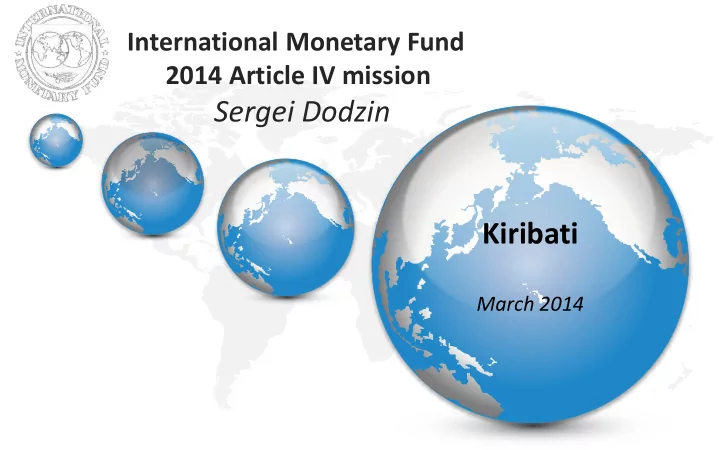

International Monetary Fund 2014 Article IV mission Sergei Dodzin Kiribati March 2014
Kiribati: Setting in a Cross-Pacific Context
Kiribati is one of the lower income… 3
… and the most remote islands among small states. 4
The country relies heavily on foreign aid… 5
…to finance its large development needs, which are contributing to import demand. 6
Public sector is dominant due to economy’s narrow production base… 7
…and constraints to private sector development. 8
Kiribati: Recent Developments
Food and fuel prices have recovered since 2009, raising somewhat the costs of Kiribati imports.
Kiribati Real Effective Exchange Rate broadly follows Australian dollar.
The number of Kiribati seamen on board of international ships has been declining.
Yields on Australian securities are relatively high, helping RERF investments.
Kiribati: Achievements, Challenges and Recommendations
Kiribati - Achievements • The government is pursuing a broad range of reforms with the help of development partners • SOE reform improved efficiency and established a strengthened legal framework for governance, financial reporting, and management of SOEs. • Introduction of a value added and excise taxes is planned in April 2014.
Kiribati – Achievements (continued) • Work is underway to improve fisheries policy. • The government plans to introduce improvements in RERF management and asset allocations.
Kiribati - Challenges • Stabilizing RERF should continue to be a major objective. • Underperforming SOEs (in particular PUB) are still a drag on the budget. • Revenue collection needs to be improved • VAT implementation
Kiribati – Challenges (continued) • Unemployment remains very high • Private sector opportunities need to be improved • Addressing infrastructure challenges (both in South Tarawa and the outer islands). • Climate change and its impact. • Ensuring financial sector soundness
Copra Subsidy • Copra subsidy scheme in its current design lacks efficiency. • Options for improvement may include alternative forms of subsidies and transfers.
SOEs • The government has been implementing SOE reforms. • Some challenges remain, in particular with losses at PUB. Work is underway to strengthen revenue collection and improve PUB’s performance.
Fiscal Sustainability • Achieving stable RERF real per capita balance would require substantial reduction in recurrent balance in the medium term. • The budget should continue to avoid financing of recurrent deficit by non-concessional borrowing. • Even after introducing VAT additional reforms would be needed to eventually stabilize RERF per capita value. • Improving public financial management and developing debt and guarantee policy is important for fiscal sustainability.
Fishing license fees increased significantly in the last two years…
Baseline Scenario: Eliminating Overdraft in 2012 Reduced Budget Costs. However, RERF Per Capita Balance Is Still Falling…
Under the baseline scenario RERF still falling in per capita terms over the longer run
High Fishing License Fees Scenario…
Under the high fishing license scenario it would be easier to stabilize the RERF
Private Sector Development • Key to supporting robust growth. Focus areas: • Developing fishing industry to utilize marine resources beyond license fees. • Tourism • Education and opportunities to have working experience abroad. • Removing obstacles for doing business.
Supporting Private Sector Growth Ease of Doing Business Indicators (2014) FIJ KIR RMI FSM SOL SAM Rank 1 62 122 114 156 97 61 Getting electricity rank 81 159 77 106 130 37 Cost (% of income per capita) 1835 5296 730 375 2114 783 Getting construction permits (days) 142 170 76 114 92 87 FIJ=Fiji Islands, FSM=Federated States of Micronesia, KIR=Kiribati, RMI=Republic of Marshall Islands, SOL=Solomon Islands, SAM=Samoa, TON=Tonga. Source: World Bank Doing Business Report, 2014. 1 Economies are ranked from 1-185, 1 being the best and reflective of a conducive environment for business operations. Looking at the business environment, improving doing business indicators and reducing business costs are important for attracting and securing both foreign and domestic investment.
Supporting Private Sector Growth (cont.) Business Legal Environment Indicators (2014) FIJ KIR RMI FSM PNG SAM TON Enforcing contracts 63 74 61 152 168 77 48 Cost (% of claim) 39 26 27 66 110 20 31 Time (days) 397 660 476 885 591 455 350 FIJ=Fiji Islands, FSM=Federated States of Micronesia, KIR=Kiribati, RMI=Republic of Marshall Islands, PNG=Papua New Guinea, SAM=Samoa, TON=Tonga. 1 Index ranges from 0 to 10, with higher values reflective of better investment protection. Accessing land, together with obtaining licenses, was identified as the biggest impediment to starting a business in a KCCI survey of businesses.
The IMF is committed to continue working in partnership with the government and international community to assist in addressing challenges facing Kiribati. Thank you!
Recommend
More recommend